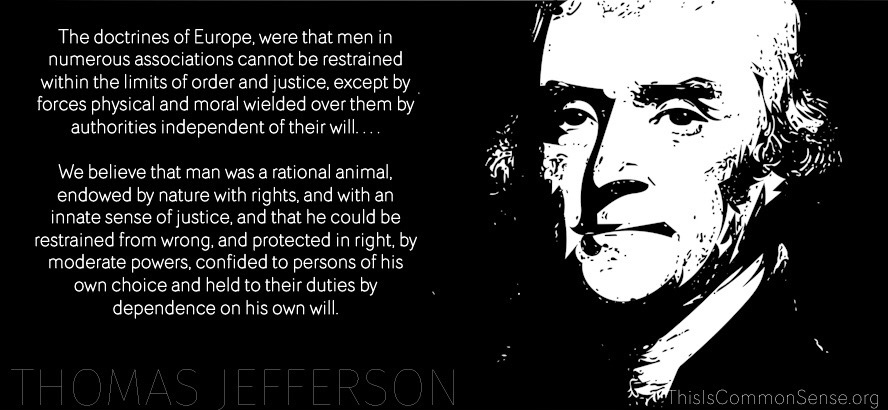The doctrines of Europe were, that men in numerous associations cannot be restrained within the limits of order and justice, but by forces physical and moral, wielded over them by authorities independent of their will. Hence their organization of kings, hereditary nobles, and priests. Still further to constrain the brute force of the people, they deem it necessary to keep them down by hard labor, poverty and ignorance, and to take from them, as from bees, so much of their earnings, as that unremitting labor shall be necessary to obtain a sufficient surplus barely to sustain a scanty and miserable life. And these earnings they apply to maintain their privileged orders in splendor and idleness, to fascinate the eyes of the people, and excite in them an humble adoration and submission, as to an order of superior beings. Although few among us had gone all these lengths of opinion, yet many had advanced, some more, some less, on the way. And in the convention which formed our government, they endeavored to draw the cords of power as tight as they could obtain them, to lessen the dependence of the general functionaries on their constituents, to subject to them those of the States, and to weaken their means of maintaining the steady equilibrium which the majority of the convention had deemed salutary for both branches, general and local. To recover, therefore, in practice the powers which the nation had refused, and to warp to their own wishes those actually given, was the steady object of the federal party. Ours, on the contrary, was to maintain the will of the majority of the convention, and of the people themselves. We believed, with them, that man was a rational animal, endowed by nature with rights, and with an innate sense of justice; and that he could be restrained from wrong and protected in right by moderate powers, confided to persons of his own choice, and held to their duties by dependence on his own will. We believed that the complicated organization of kings, nobles, and priests, was not the wisest nor best to effect the happiness of associated man; that wisdom and virtue were not hereditary, that the trappings of such a machinery, consumed by their expense, those earnings of industry, they were meant to protect, and, by the inequalities they produced, exposed liberty to sufferance. We believed that men, enjoying in ease and security the full fruits of their own industry, enlisted by all their interests on the side of law and order, habituated to think for themselves, and to follow their reason as their guide, would be more easily and safely governed, than with minds nourished in error, and vitiated and debased, as in Europe, by ignorance, indigence and oppression. The cherishment of the people then was our principle, the fear and distrust of them, that of the other party.
Thomas Jefferson, Letter to William Johnson (1823).
Categories
Thomas Jefferson
